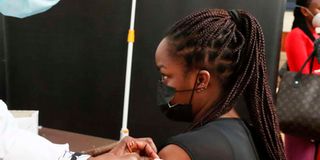Vaccinating all Kenyans is a collective responsibility

A woman receives the Covid-19 vaccine at Milimani Law Courts, Nairobi, in September.
The outrage following the government’s requirement that all Kenyans get vaccinated or be denied access to its services overshadows the real issue: The call for vaccination is not being responded to sufficiently to protect all citizens.
Whereas the Health Cabinet secretary’s announcement may sound punitive — and human rights groups are already taking the government to task over it — we have to stop and consider what it will take to get the majority of the population vaccinated as this seems to be the only way out of the Covid-19 pandemic. The indignation brought by this declaration should spur positive action for vaccination.
With over 10 million vaccine doses in stock and only 2.4 million Kenyans (nine per cent of the eligible population) fully vaccinated, the country is far from reaching its target of 10 million persons this year.
Vaccination has been shown to reduce the risk of severe disease and death from Covid-19. With the current surge of infections, countries with the lowest vaccine coverage are predicted to bear the largest burden of disease.
Critical care
Low levels of vaccination, especially in the context of reduced non-pharmacologic measures such as mask-wearing, allows for increased transmission of SARS-CoV 2. This is being seen in Europe. Where there is high transmission, more people get sick and require hospitalisation and critical care, burdening fatigued and overstretched healthcare systems.
We may require a reintroduction of the recently lifted containment measures. In Europe, countries with less than 60 per cent of their population vaccinated are being advised to significantly reduce physical contact, pointing at reinstitution of stay-at-home directives and banning of public gatherings.
Since Kenya got out of the last Covid-19 surge, vaccine queues have grown increasingly shorter. As a specialist, I urge all Kenyans to take the vaccine and save us all from another devastating surge of pandemic. One could argue that the choice is personal; but where it affects others, then it becomes everyone’s responsibility to protect one another.
Vaccine uptake
This is not just the government's responsibility. We must all play a role in ensuring greater vaccine uptake. The government must take the vaccine to the people with convenient vaccination drives at markets, churches, public transport termini and workplaces. And these vaccination sites must be accessible at times, including after-hours and at weekends.
We must all do more to counter anti-vaccine myths and educate Kenyans on the importance of the jab. That means working with stakeholders to engage Kenyans where they live and work. All Kenyans in the public space must use every opportunity to promote vaccination. We should not start public gatherings until a vaccination call has been made.
Every Kenyan must not only walk to the vaccine centre but also tag along neighbours, friends and family members. Let vaccination status not deny us public service; we will all have been vaccinated.
Dr Ombajo is an infectious disease specialist at the University of Nairobi spearheading management of Covid-19 [email protected].





